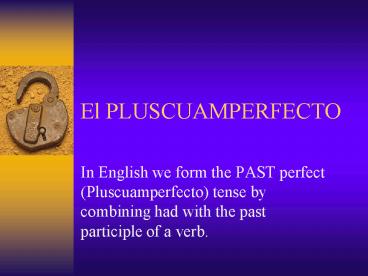El PLUSCUAMPERFECTO - PowerPoint PPT Presentation
1 / 12
Title:
El PLUSCUAMPERFECTO
Description:
The Past Participle of a Verb: ... the past participle. With the ... When the past participle is used with any forms of haber, the final o never changes ... – PowerPoint PPT presentation
Number of Views:613
Avg rating:3.0/5.0
Title: El PLUSCUAMPERFECTO
1
El PLUSCUAMPERFECTO
- In English we form the PAST perfect
(Pluscuamperfecto) tense by combining had with
the past participle of a verb.
2
Por ejemplo
- He had seen
- I had eaten
- Had you tried?
- You hadnt studied!
3
The Past Participle of a Verb
- You have already learned to form the past
participle of a verb in Spanish by adding ado to
the stem of ar verbs - You add ido to the stem of most er and ir
verbs.
4
To form the Present-Perfect Tense
- Combine the past participle
- With the imperfect tense of the verb haber
5
Present Tense forms of HABER
- Había
- Había
- Había
- Habíamos
- Habíais
- Habían
6
Spanish vs. English
- We generally use the Spanish pluscuamperfecto in
the same way we use its English equivalent.
7
The Pluscuamperfecto
8
NOTICE !!! ojo!
- When the past participle is used with any forms
of haber, the final o never changes - Ricardo había grabado su película favorita.
- Ricardo HAD TAPED
- Sus hermanos habían grabado una telenovela.
- His sisters HAD TAPED
9
NOTICE !!! ojo!
- Certain verbs that have a double vowel in the
infinitive form (except those with the double
vowel ui) require an accent mark on the í in the
past participle. For example - Caer ? caído
- Leer ? leído
- Oír ? oído
- Creer ? creído
10
Irregular Past Participles
vuelto
abrir
abierto
volver
decir
dicho
roto
romper
escrito
escribir
poner
puesto
hecho
hacer
ver
visto
11
The PLUSCUAMPERFECTO
- The pluscuamperfecto is often used in Spanish
with the word YA already to express that
someone HAD ALREADY DONE SOMETHING. - A las 800 de la mañana, los estudiantes YA
habían llegado a la escuela - At 800 the students HAD ALREADY ARRIVED at the
school.
12
YA ALREADY!!
- Yo ya había limpiado mi dormitorio.
- Tú ya habías termindado tu tarea.
- Ellos ya habían salido para México.































